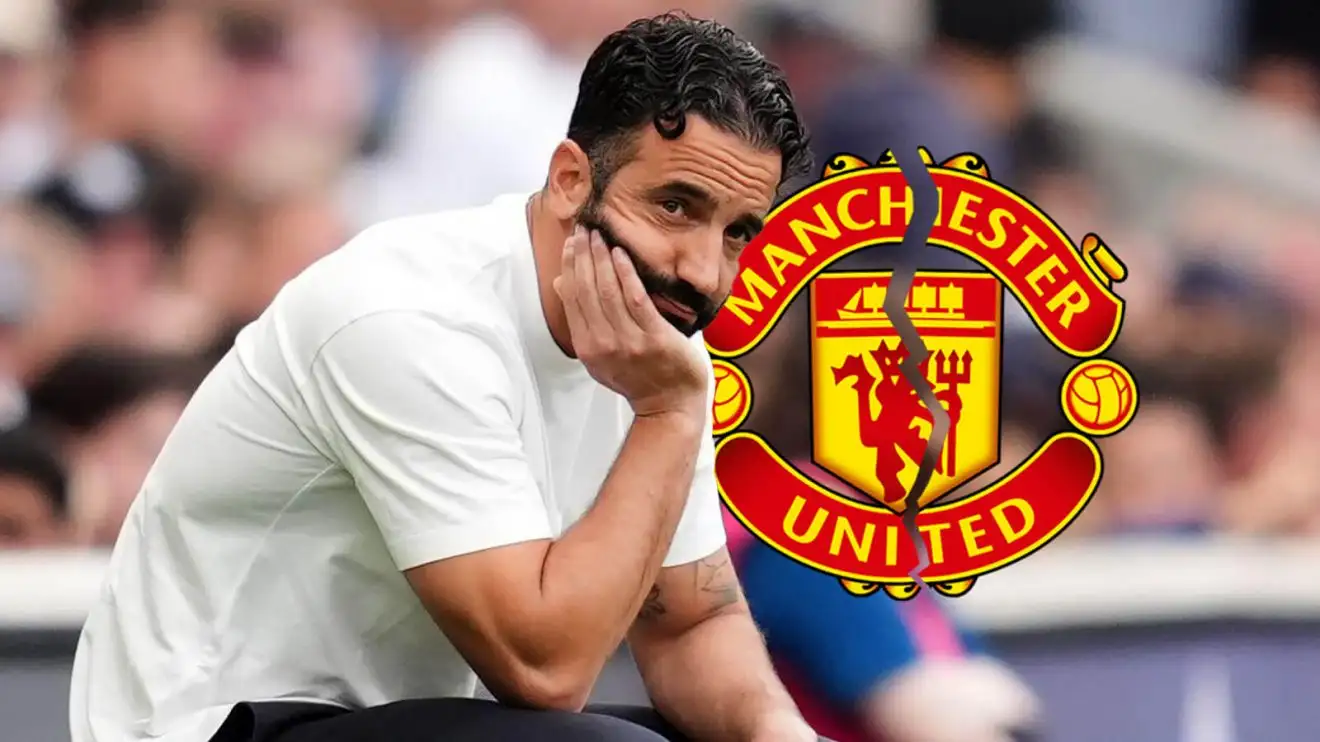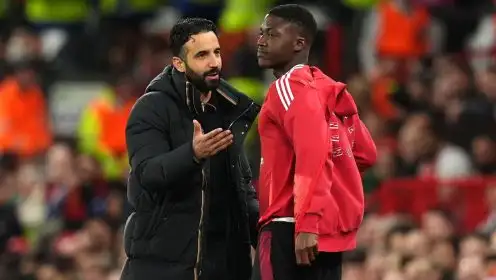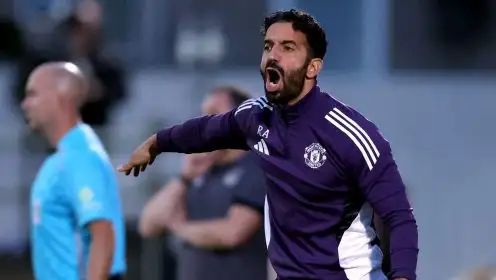Why the five post-Fergie Man Utd managers before Amorim were sacked

Bruno Fernandes’ stoppage time penalty kept the sack wolves from Ruben Amorim’s door for the international break as a 3-2 victory over newly promoted Burnley granted the Portuguese boss a novel experience in his shockingly poor Old Trafford tenure to date: a spot in the top half of the Premier League.
The boost of an all-new forward line signed during the transfer window has been offset by the failure to fix an enduring midfield problem felt by at least two managers before him, while a goalkeeper has been signed who will likely add to his No.1 conundrum rather than solve it, in the short-term at least.
He reached a United nadir in defeat to League Two Grimsby Town and any significant increase on his 26 per cent Premier League win percentage feels unlikely despite him having a pre-season to bed in his ideas and a philosophy he remains staunchly wedded to despite it showing no signs of coming good.
United continue to back him in the faint hope that a group of unsuitable players for his system will miraculously grasp the nettle, or be coached into grasping it, with the alternative an admission of either his botched appointment or more deeply-rooted problems in a football club that were supposed to have been fixed by Sir Jim Ratcliffe and his INEOS team.
INEOS ‘will not be decided by a knee-jerk reaction to one or two bad results’ and with a view to winning the Premier League in 2028 ‘believe changing philosophy now would be a greater risk than persevering with Amorim’. But they have given him an ultimatum.
‘The expectation is Champions League football. Falling short of that target may be tolerated if progress is evident, but missing out on European competition entirely would likely prove fatal to Amorim’s tenure.’
But there are presumably alternative final straws which could trigger his sacking – if indeed he doesn’t walk before he’s pushed – and while his post-Sir Alex Ferguson predecessors all have being a bit sh*t as a commonality in their dismissals, we’ve picked out the key reason they were sent packing from Old Trafford.
David Moyes – Not being Sir Alex Ferguson
As crimes go, not being the most successful manager in Premier League history is barely worth a slap on the wrists. And in hindsight, even given Sir Alex Ferguson’s standing as Mr Manchester United by the summer of 2013, a football club allowing a sitting manager to select their replacement is a madness, especially when Fergie’s selection criteria appeared to be ‘a guy I like’, ‘quite old’ and ‘Scottish’.
The passage of time and the shortcomings of those who have come after him have worked in Moyes’ favour. Feelings at the time that he wasn’t given a fair shot with Marouane Fellaini his sole summer signing to aid an ageing squad have only grown since since to a point where most feel sympathy for Moyes at taking a job he couldn’t turn down but was doomed to fail in.
Unai Emery similarly endured the difficulties of replacing a legacy Premier League manager at Arsenal, while Arne Slot’s success at Liverpool is in large part down to the rebuilding work already done by honorary scouser Jurgen Klopp, who left him with a squad ready to win the title rather than a title-winning squad past the peak of its powers.
Louis van Gaal – Boredom
“The players looked bored themselves,” Paul Scholes said in January 2016 having watched Van Gaal’s side labour to a 1-0 FA Cup third-round win over Sheffield United. “There’s no spirit, there’s nobody having a go at each other, there’s no smiling, there’s no entertainment.”
United failed to score in 23 of the Dutchman’s 103 games in charge and drew 19 of their 76 in the Premier League, with the majority of Van Gaal-based entertainment emanating from the touchline or in press conferences.
Responding to Scholes’ criticism, which by no means limited to the above, Van Gaal questioned whether his comments were for “the benefit of the club, or the benefit of himself?” He never got the United punditry cabal onside and the fans echoed their sentiments of apathy over the style of football, which led to third and fifth-placed finishes in the Premier League, with the FA Cup gong at the end of his second season not enough to save Van Gaal from a tide that had turned through weeks and months of stale football.
MORE MAN UTD COVERAGE ON F365…
👉 Man Utd’s second-choice keepers, Liverpool’s Guehi-shaped hole and other post-window squad gaps
👉 Man Utd learn why Leeds, Sunderland rejected Lammens as PL duo saw Belgian as ‘risk’
👉 Man Utd decide what would ‘prove fatal’ for Amorim this season as sack ruling is made
Jose Mourinho – Bigger than the club
Mourinho has claimed that “one of the best jobs of my career was to finish second with Man United in the Premier League” in a hot take which has since become lukewarm as his successors have boosted the notion that it was indeed a praise-worthy achievement in a post-Fergie era.
A confrontational style of leadership, a public rift with Paul Pogba, slams of Luke Shaw among others and a general feeling among staff that he was a ‘high maintenance’ manager, meant that questions as to whether he was ‘the right fit’ started on day one and never got close to being dispelled despite that runner-up finish and the Europa League and League Cup wins.
A public flirtation with PSG on the back of consistent claims by Mourinho that he was not being backed in the transfer market, including days after buying Fred for £50m, led to a feeling that by the end (let’s face it, probably throughout) he felt he was bigger than the club.
The jury’s out as to whether Mourinho is bigger than Manchester United, albeit now as a free agent having been sacked by Fenerbahce having managed Tottenham and then Roma following his dismissal by Ed Woodward.
Ole Gunnar Solskjaer – Smaller than the club
There have been entirely predictable wonderings, revisions of reality and distortions of the truth on United Twitter after the fans have watched admittedly less exciting and usually far less effective football under Ten Hag and Amorim than they saw under Solskjaer.
Clipped up videos of the best goals in the Solskjaer era make for absorbing viewing. The players did things like one-touch passing, showed speed on the break and often genuinely looked as though they were enjoying the thing they were being paid multi-millions of pounds to do.
The problem with Solskjaer was, the long and short of his footballing ethos appeared to be ‘you’re good footballers, go out there and play good football’. Now, while we by no means sign up to this mood-killing obsession with philosophy and strict guidelines, and would like nothing more than an unshackled team being successful, the reality of modern day football is that success can’t be powered by vibes.
Solskjaer arrived armed with little more than his legendary status as a footballer at Old Trafford and it never felt as though he ever got past the point of being no more than a guy too old to be in the XIs he was selecting, with the respect he earned from his players based on him scoring a goal in 1999 rather than from any instruction on the training pitch or from the sidelines.
Erik ten Hag – No identity
His Manchester United tenure was defined by a clash between his build-from-the-back style and the ‘Manchester United DNA’ he obsessively referenced as something he had to adhere to, along with some heroically awful signings.
It was never clear whether there was any external pressure to ‘attack, attack, attack’ – Busby Babes appearing in his dreams, Roy Keane leaving ‘This Is Manchester United’ voicemails – but what we got from Ten Hag’s teams, particularly after that first half-decent campaign, was a ropey defence protected by a labouring midfield, supporting a blunt attack, with no clear identity involved in any of it.
“What I see is a collection of single passes where a player receives it and has to work out where the next player is, rather than knowing where the next player is,” Gary Neville said in March 2024, seven months before his sacking which was postponed by an FA Cup final performance and win over Manchester City which came out of nowhere and evidently wasn’t any sort of harbinger for success.



